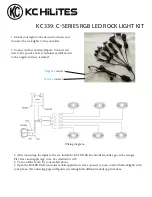
[page 14] | gpelectric.com
4.5 INSTALLING THE SOLAR CHARGE CONTROLLER
Ensure the Solar Panels are covered. Cover the nel faces completely with an opaque material to stop the production of
electricity when working with panels or wiring – the cardboard shipping boxes are the perfect option to cover glass surface
of the panels.
1. Use the template included in the solar charge controller Manual to mark the four mounting holes. For the GP-PWM-30 also mark
the “cutting line for flush mounting”.
2. Drill the mounting holes.
3. For the GP-PWM-30 use a keyhole or jig saw to cut along the rectangular outline previously marked.
4.
Cut the MC4 extension cables to length, allow some excess for strain relief/flexibility.
5. Use the leftover cable to connect the controller to the batteries ensuring the Fuse holder is installed as per 4.7 & 4.8. If extra
battery cable is required to connect to the battery bank, Go Power! recommends using an equivalent cable to that supplied with
the kits: 10 Gauge Wire rated to – UL/cUL/USE2.
6. Mount the controller to the wall using the four wood screws provided.
7. Ensure the back of the controller is protected from damage by any object
4.6 INSTALLING THE FUSE AND FUSE HOLDER
1. Locate the positive battery cable from the solar charge controller
2. Plan where you can safely and easily access the fuse holder & fuse
3. Cut the battery positive cable from the solar charge controller
to the planned lengths
4. Strip the fuse holder cable and positive cable from solar charge
controller as shown in Fig 4-F
5. Thread the red heat-shrink onto the fuse holder cable
6. Insert the fuse holder and solar charge controller stripped cable
ends into the butt splice as shown in Fig 4-G
7. Crimp the butt splice fully - test the connection by gently pulling
on both cables
8. Thread the heat-shrink over the butt splice as shown in Fig 4-H
9. Use the heat gun to shrink the heat shrink over the butt splice
as shown in Fig 4-I
10. Repeat the process for the other fuse holder cable & battery
bank connection.
11. Do not install the fuse at this stage
4.7 CONNECT THE GP-PWM-30 TO BATTERY BANK
It is recommended to connect directly to the battery whenever possible.
You can also connect to the converter/charger where the battery positive
and negative wires connect to the converter/charger
1. Clean all corrosion from the battery terminals before proceeding
2. Crimp ring terminals onto the positive and negative cables to
be attached to the battery
3. Check the ring terminal crimp connection by gently pulling on
the cable and ring terminal
4. Attach the Negative (Black) ring terminal to the battery bank
and tighten according to the battery manufacturers specification
5. Attach the Positive (Red) ring terminal to the battery bank and
tighten according to the battery manufacturers specification
6. Check all electrical connections
7. Apply a protective coating to the battery terminals
FIGURE 4-F
FIGURE 4-G
FIGURE 4-H
FIGURE 4-I
FIGURE 4-E
Battery Bank
PWM 30
Solar Charge
Controller
3
0
A
Battery Bank
PWM 30
Solar Charge
Controller
3
0
A
Battery Bank
PWM 30
Solar Charge
Controller
3
0
A
Battery Bank
PWM 30
Solar Charge
Controller
3
0
A
Battery Bank
PWM 30
Solar Charge
Controller
3
0
A
Battery Bank
1
0
A
PWM 10
Solar Charge
Controller
INSTALLATION
Summary of Contents for Go Power! Solar Flex Kit GP-FLEX-110
Page 2: ......




































